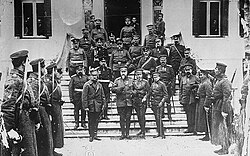
Back Fashoda-voorval Afrikaans حادثة فشودة Arabic Incident de Fashoda Catalan Fašodská krize Czech Faschoda-Krise German Επεισόδιο της Φασόντα Greek Incidente de Fachoda Spanish Fashodako gatazka Basque بحران فاشودا Persian Fashodan selkkaus Finnish
| Fashoda Incident | |||||||
|---|---|---|---|---|---|---|---|
| Part of the Scramble for Africa | |||||||
 Map of Central and East Africa during the incident | |||||||
| |||||||
| Belligerents | |||||||
|
|
| ||||||
| Commanders and leaders | |||||||
|
|
| ||||||
| Strength | |||||||
| 132 soldiers | 1,500 British, Egyptian and Sudanese soldiers | ||||||
| Casualties and losses | |||||||
| None | None | ||||||
| Events leading to World War I |
|---|
 |
|
The Fashoda Incident, also known as the Fashoda Crisis (French: Crise de Fachoda), was the climax of imperialist territorial disputes between Britain and France in East Africa, occurring between 10 July to 3 November 1898. A French expedition to Fashoda on the White Nile sought to gain control of the Upper Nile river basin and thereby exclude Britain from Sudan. The French party and a British-Egyptian force (outnumbering the French by 10 to 1) met on friendly terms. However, in Europe, it became a war scare. Both empires stood on the verge of war with heated rhetoric on both sides. Under heavy pressure, the French withdrew, ensuring Anglo-Egyptian control over the area.